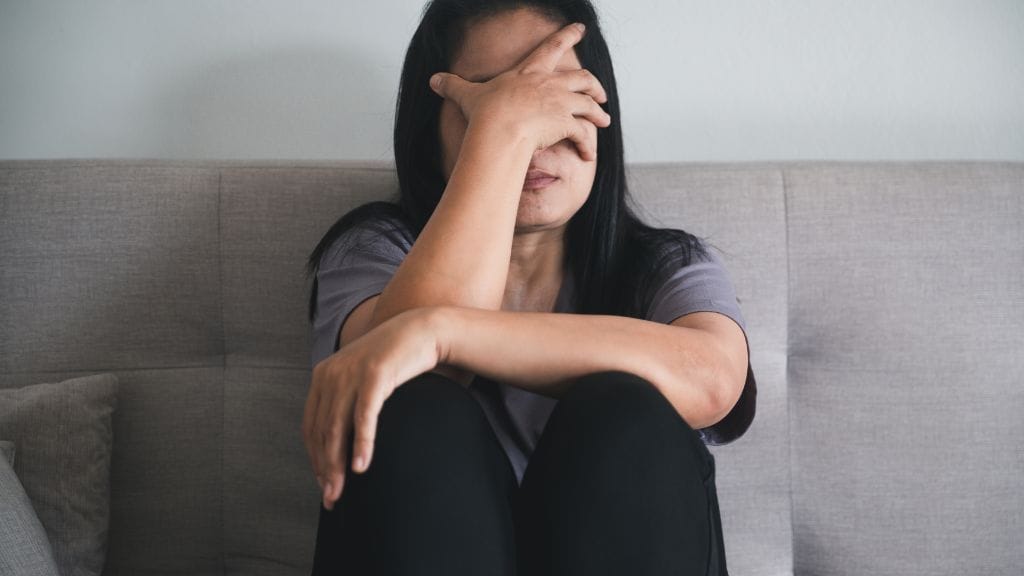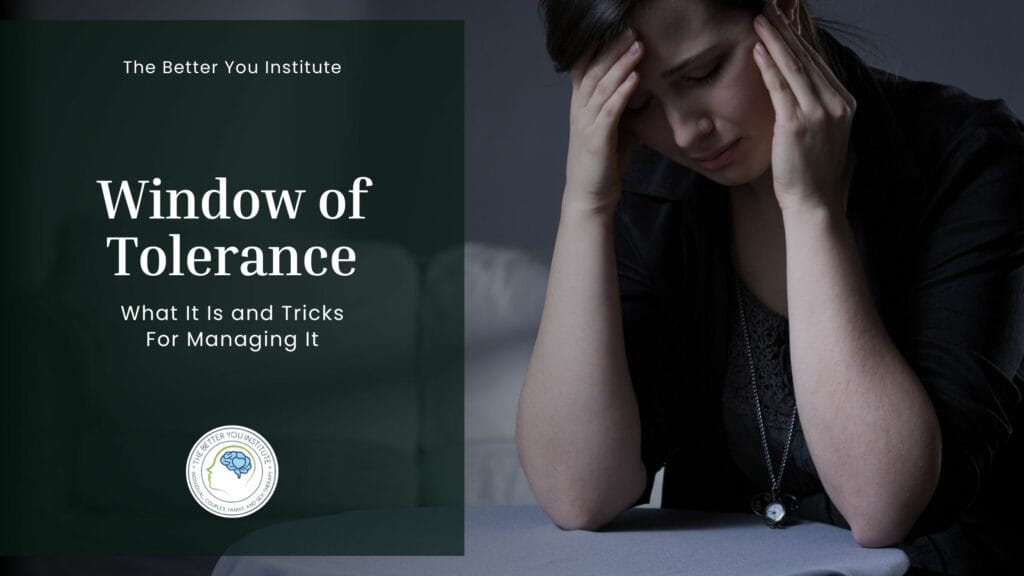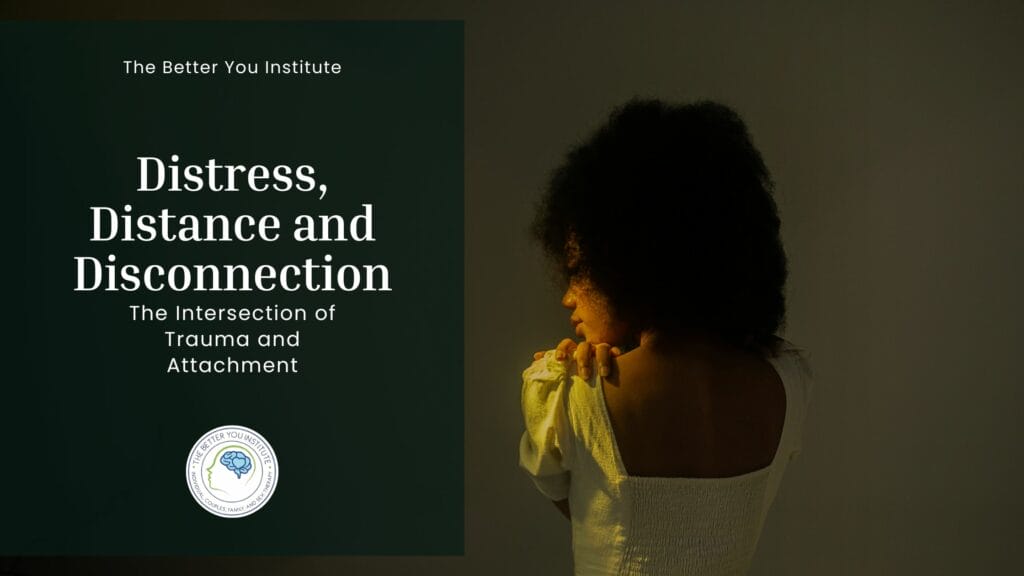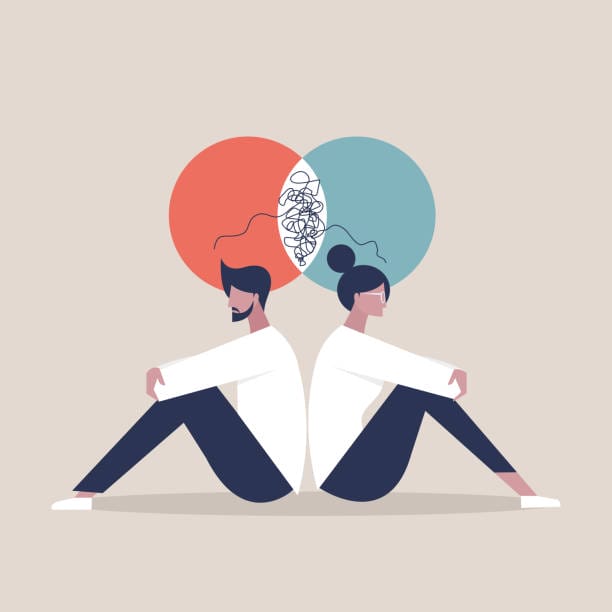Table of Contents
What is PCOS-related depression, and how can you manage it?
Have you recently been diagnosed with Polycystic ovary syndrome (PCOS)? Do you also suffer from depression? Maybe you’ve had both of these diagnoses for a while but you’re not sure what that actually means for you and your quality of life. You probably know that PCOS is a hormonal disorder that affects many aspects of a person’s health, but did you know that this includes their mental well-being?
The link between PCOS and depression is complex, with various factors contributing to the increased risk of experiencing depressive symptoms. This article will explore the connection between PCOS and depression in detail and shed light on how online therapy and in-person therapy can be valuable for individuals navigating both conditions. Join us as we embark on this journey of understanding and healing.
*Disclaimer* The terms “male” and “female” will be used throughout this article to refer to assigned sex at birth. They do not define the gender identity of the person that may be experiencing these symptoms.
What is PCOS?
Polycystic ovary syndrome (PCOS) is an endocrine disorder that can be seen in females. There is no singular known cause, but usually, people with this condition can be seen with higher levels of the reproductive hormone known as androgens. Increased androgen levels may lead to cysts that form on the ovaries due to a lack of ovulation.
What is an endocrine disorder?
An endocrine disorder is a hormone imbalance resulting from an endocrine gland that makes an excess or deficit of a hormone. This disorder can be caused by genetics, infection, or injury to the endocrine gland. Tumors can also develop in the endocrine system, causing an endocrine disorder.
Physical Symptoms from PCOS
Those with PCOS often are insulin resistant or have elevated insulin levels. Some symptoms of PCOS may include missed periods, enlarged ovaries or cysts, inflammation, hirsutism (excessive body hair growth), weight gain, acne, thinning hair, infertility, skin tags, and dark/thick skin patches on the back, the bust and the back of the neck. If you are experiencing these symptoms and have not done so already, consult a doctor. There was no cure for PCOS when this article was written, but there are ways to help manage its symptoms.
Ways to manage: Physical Health and Advocacy at the doctor’s office.
A major factor in PCOS management is keeping track of our physical health. This can manifest in various ways, the most common being diet and exercise, but also ensuring that you maintain checkups at the doctor’s office. A doctor can provide medication with specific areas you want to target as related to symptoms, they can also help you find new cysts on ovaries or answer any questions that you may have regarding your diagnosis. However, it is important to bring awareness to when a doctor is helping and when a doctor is hurting.
Speaking up for yourself and your symptoms at a doctor’s office can often be incredibly scary and overwhelming. Especially for people with a disorder such as PCOS that is not fully understood and often overlooked. It is frustrating to go from doctor to doctor, doing test after test without finding out what is “wrong” with you. One thing you can do to advocate for yourself is write down a specific list of things you want to discuss with your doctor. Oftentimes, doctors do not have the time allocated to go over every symptom in one visit, so writing down your most pressing concerns may be the right way to go. Doing this also allows you to gather your thoughts and know precisely what you want to say, so when the time comes that the doctor asks you what’s going on, you can give them a thought-out and concise answer. If you are in psychotherapy with someone specializing in PCOS, the therapist can help you create this list and empower you to advocate for yourself.
Another part of advocating for yourself is knowing when it is okay to find another doctor. If you feel your doctor does not hear you, they are dismissing you or your symptoms, or belittling you in any way, shape, or form, it is time to find a new doctor. “Firing” your doctor may seem like something that could be challenging or awkward, but in the end, finding a practitioner that fits you and your PCOS symptoms will be better for your mental health in the long run.
PCOS as it relates to marginalized populations
PCOS for BIPOC
Research on this topic is still few and far between, and we are still not close to cracking the “true” cause of PCOS. Although any race may be affected by PCOS, black and Latinx females disproportionately experience PCOS in the severity of symptoms and frequency. Latinx people have the highest rates of androgen levels and insulin resistance. Although people of color may be experiencing elevated symptoms compared to white women, systemic issues often cause a lack of research with these specific populations or a lack of concern or overlooking symptoms from doctors.
PCOS for LGBTQ+
Trans and non-binary people may experience symptoms of PCOS differently than cisgender women. Some trans and non-binary folks (depending on the way they wish to present) may find that their PCOS symptoms, such as extra facial and body hair growth, may cause symptoms of gender euphoria, which creates immense joy and comfort in affirming true gender identity but that may not be the case for everyone. However, the medical community still has a long way to go in terms of language and care of trans and non-binary people as it is still disproportionately gendered to strictly feminine terms and treatment suggestions. As trans and non-binary people, your mental and physical health is just as important as any cisgender woman, and you deserve to find a provider and treatment that works for you.
Depression
Having PCOS can come with a whole gamut of psychological and emotional problems. Depression is the most prominent diagnosis; therefore, this article will focus on depression and PCOS. The signs of depression may not always be clearly defined or understood, specifically to those experiencing these symptoms for the first time. Depression can look like so much more than feeling sad or anything psychological.
Depressive symptoms can also be physical or behavioral. Some psychological components may include guilt, hopelessness, apathy, loss of interest in activities, mood swings, and sadness, including thoughts of suicide. Examples of physical effects of depression are trouble sleeping (either waking up or falling asleep), over or under-eating, weight gain/loss, or behavior issues like social withdrawal and unbridled crying. People with depression can experience any number of these symptoms, and depression can result from several issues. However, for continuity, symptoms of depression will be examined as they relate to PCOS symptoms.
PCOS-related depression
The link between hormone disorders and mental illness has shown to be a strong one. As previously mentioned, people experiencing symptoms of PCOS may also develop depression. Many believed contributing factors are discussed below. However, research has not found one particular cause of PCOS-related depression. Only many are theorized beliefs for the various “roots” of the problem.
Inflammation
Inflammation in the body has been prevalent in some patients with PCOS. When inflammation occurs, the body swells to heal when injured or ill. People with PCOS suffer from inflammation more frequently than people without because of proteins in their blood. Chronic inflammation leads the body to attack its own cells and can cause inflammation to persist for months or years. During this process, the body releases cortisol, a hormone that acts as an anti-inflammatory to help decrease the swelling and stress on the body.
Many studies show that cortisol is made in the adrenal glands that release the hormone to the pituitary gland and hypothalamus. Cortisol plays a vast role in the body. Not only does it help with stress, but it regulates blood sugar, metabolism, forming memories, and sleep. Cortisol is often triggered in scenarios of fight or flight.
A fight or flight response can happen in immediate physical danger, like getting robbed or seeing someone in danger. However, fight or flight also happens during emotional or psychological stressors such as sitting in traffic or answering text messages. These scenarios have no visible threat, yet, the body often feels drained from this experience. Chronic physical stress may lead to depression because your body is constantly in a fight or flight state, which it struggles to maintain. Depression is how your body shuts down your fight or flight when your parasympathetic nervous system becomes overwhelmed.
Weight Gain
As discussed earlier, people with PCOS often have difficulty producing either too much or too little insulin. Larger-bodied people are more likely to have PCOS, similar to how people with PCOS are more likely to gain weight more frequently. When there is an inability to regulate insulin properly, weight is easily influenced by this. For those who have PCOS, it can be incredibly difficult to lose or gain weight. Large amounts of weight gain explicitly impact depression by increasing inflammation, which also increases cortisol levels, as discussed above. As we gain weight, it is extremely common to become emotionally distressed and discouraged by the changes in our appearance. It is important to remember that you are far more than just how your body looks, and our bodies are meant to change over time.
Infertility
Many of those who have PCOS may experience problems with infertility. Elevated levels of androgens result in the absence of ovulation. Without ovulation, it leads to infertility problems. Sometimes, these infertility problems can lead to depression. Those experiencing struggles with infertility may feel guilt, hopelessness, frustration, and feelings of worthlessness. Although not everyone may develop these feelings based on infertility, it is important to acknowledge that every experience is valid.
Social Stigma and Body Image
PCOS is a disorder that may bring up a lot of negative feelings toward oneself. Whether that be issues with weight gain, infertility, or excessive facial and body hair, any of these things can influence self-esteem in a way that causes negative thoughts toward our bodies. How we speak to and think about ourselves can cause issues with body image. Societal expectations from our families, peers, and the media often perpetuate these shame-inducing ideas of what we should and should not look like. Having formed an idea of what a “perfect body” should look like, it is easy to compare ourselves to that image of what we “should” look like in our head, this can be especially troublesome if you suffer from PCOS and believe that your symptoms are keeping you from your desired appearance, weight, life, etc.
Some questions to ask yourself to see if your PCOS is impacting your self-esteem:
- Are any of my PCOS symptoms related to my idea of gender?
- What is my idea of gender?
- Do I feel broken because I’m having fertility issues due to my PCOS?
- Do I still feel attractive with facial/body hair?
- Does my PCOS affect my social life?
- Am I uncomfortable telling my friends and family about my PCOS symptoms?
- Would I feel more comfortable in my body if I did not have these symptoms?
- Do I hide myself or my body because of my PCOS?
- Has gaining weight made me feel any less desirable?
- Do I feel like no one can relate to my symptoms?
- Do I often feel down on myself or my life when I think of my PCOS diagnosis?
- Do I beat myself up when I have a PCOS-related symptom?
- Do I feel less than others because I have PCOS and they don’t?
- When I think of my PCOS, I feel worthless, unloveable, or not good enough.
If you answered yes to some, most, or all of these questions, you may be experiencing low self-esteem due to your PCOS. Don’t worry, there are some things that you can do to boost your self-esteem regarding your PCOS symptoms.
How to separate yourself from your diagnosis
A crucial part of separating yourself from your diagnosis is remembering that you are, first and foremost, a person and not a diagnosis. For example, I have PCOS symptoms, or I am a person with PCOS versus I’m diseased with PCOS. If you struggle with infertility, you are a person with fertility issues rather than infertile. What language you use is so important and can have a significant impact on how you see yourself and your mental health.
You are so much more than your symptoms. Another way to separate yourself from your PCOS is not to get caught up in the name of the diagnosis. PCOS can often look like a myriad of symptoms that are different for every person. Just because the internet lists a particular symptom of PCOS online that scares you does not mean you will develop it. Your symptoms are entirely unique to you.
Creating your own definition of femininity
Cisgender women suffering from PCOS symptoms can often struggle with the idea of femininity. Whether you are suffering from excessive weight gain, infertility, facial or body hair, or low sex drive, these symptoms can take a toll on our definition of what it means to be a woman. Your experience with femininity may not look the same as other women’s; that can be something to grieve over. A big part of your journey with PCOS may be that you create your own definition of what it means to be feminine, even if it does not look like the traditional definition or societal norm.
Being kind to yourself
The most important part of an uphill battle with self-esteem issues is remembering to give yourself grace. With a diagnosis such as PCOS, it can be extremely easy to speak negatively about yourself because of your symptoms. Practicing kindness to yourself can start in a really simple way, stand in front of a mirror and say a few nice things about yourself. If you do not feel like you are in a place where you can think of anything nice to say about yourself physically, you can talk about your personality, style, or anything else you can think of. Try this out for a few days before you wake up rather than focusing on your perceived negatives about yourself. Ultimately, the goal is to lean into you the way you are right now. Can you learn to love the parts of yourself impacted by PCOS?
PCOS-related depression management:
Medicine
After consulting with a doctor, it is possible to take specific medication to treat not only the symptoms of depression but PCOS as well. For instance, medication to treat insulin resistance can help reduce androgen levels and promote ovulation. Metformin is often recommended for PCOS to treat insulin resistance because it helps lower insulin and blood sugar levels. If you are attempting to get pregnant, clomifene is meant to help encourage monthly egg releases, and spironolactone can be beneficial as an anti-androgen. If you are unsure if medication would be the right path for you and your PCOS symptoms, research various ones and then speak to a doctor about your options.
To treat depression specifically, there are a variety of different medications that you can take to treat your symptoms. Common depression medications include zoloft and prozac. However, it may take a few tries with different brands to find what alleviates symptoms. For many people, medication is an option that is typically used along with psychotherapy.
Diet and Exercise
Diet changes don’t always have to be to gain or lose weight. In this case, worsening or bettering PCOS symptoms are tied to diet and exercise. Specifically, anti-inflammatory diets and low-impact levels of exercise, like walking or yoga, can help reduce certain symptoms. A diet that is highly recommended is the Mediterranean diet. It suggests avoiding fried food, saturated fats, red meat, processed snacks, foods and drinks high in sugar, alcoholic drinks, and refined carbs like pizza dough. The Mediterranean diet promotes omega-3-rich fish, olive oil, whole grains, beans, and fruits and vegetables. Using this diet is meant to promote long-term sustainability in a diet and lower inflammation and insulin resistance. Although these changes will not “cure” anything overnight, the goal is to lessen some symptoms of PCOS and depression over time.
Self-care related to PCOS-related depression
A big aspect of gaining control over your PCOS-related depression is developing a healthy self-care routine. For those struggling with depression related to self-esteem issues caused by symptoms of PCOS, such as unwanted hair growth, knowing that it is okay to allow yourself to get your face and body hair waxed or lasered off. Removing skin tags or seeing a nutritionist about starting a PCOS-safe diet are also options. If infertility is something that you struggle with, you may wish to talk to a doctor about getting cysts removed, starting insulin or fertility treatments. A part of self-care is also knowing how different symptoms affect you, you may not wish to try to reverse some or any of the physical symptoms of PCOS, and that is perfectly normal. It is important to be mindful of where you are mentally with your symptoms and build what you consider your version of self-care from there.
Psychotherapy
It’s no secret that therapy is usually a go-to treatment when dealing with symptoms of depression. It can be especially important when dealing with PCOS-related depression. PCOS can frequently leave people feeling isolated as if they are the only ones dealing with these symptoms. Building a sense of community with people facing similar experiences as you can be so normalizing and feel empowering. Going to group therapy specifically for PCOS-related depression is a great solution to gain that bond with others and learn coping skills to manage symptoms.
Individual therapy is also a great option if a niche group such as the one discussed above is not available to you or if you do not feel comfortable sharing in a larger group setting. Cognitive Behavioral Therapy (CBT) and Acceptance and Commitment Therapy (ACT) are two different therapeutic models that directly challenge negative thoughts and can rework how we think about ourselves. Talk to your therapist directly about exploring these different approaches and find what works best for you and your depression.
To sum up, PCOS is an endocrine disorder that can look very different in every person affected. This variety could come in physical or psychological symptoms, leaving people dealing with them feeling completely and utterly alone. Depression can come from a variety of areas that are linked to PCOS. Whether you are struggling with depression caused by physical changes in your body, self-esteem issues, infertility, etc., therapy may be the right place to discuss these feelings. If you want to explore your mental health issues related to your PCOS or have questions about starting the process, feel free to schedule an appointment at The Better You Institute with one of our Philadelphia therapists. Call us today at 267-495-4951 to set up your appointment.
Meet The Author:

Chandler Donny
Professional Counseling Intern
Chandler Donny, a Professional Counseling Intern, views life as a novel where each chapter builds upon the previous, revealing patterns that shape our future. She believes in providing a judgment-free space for clients to share their stories, especially focusing on being an ally to the LGBTQ+ and POC communities. With experience in narrative therapy and relational-cultural theory from her master's program, Chandler tailors her approach to individual needs. Originally from California with a bachelor's degree in psychology from California State University, Fresno, she moved to Philadelphia for her master’s in mental health counseling at Temple University. Chandler plans to work with children and adults in therapeutic services, driven by her love for the city and her commitment to helping clients write new, positive chapters in their lives.
Learn more about Chandler Donny⇒







